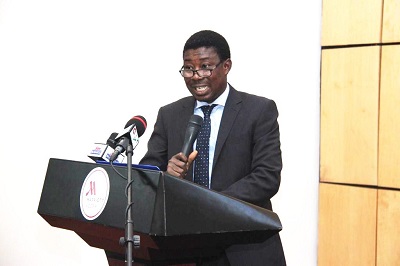
An Associate Professor at the University of Ghana Business School (UGBS), Professor Justice Nyigmah Bawole has called on government to make it mandatory for business agencies to adopt modern technology in their operations.
That, he said would equip the citizenry with adequate information about operations of businesses in the country, thus minimising the issue of corruption which has bedevilled the country.
According to him, both the public and private sector have taken advantage of the weak legislation against the act and urged the President, Nana Addo Dankwa Akufo-Addo to institute stringent laws to address corrupt practices.
Prof. Bawole was speaking at the Private Sector Led Anti-corruption Group (PSACG) forum yesterday in Accra, a non-governmental organisation that seeks to strengthen action against corruption.
The event was themed, “Building an enabling environment for private sector development: the role of the state and the private sector in fighting corruption.”
The associate professor of Public Administration and Management at the UGBS stated that corruption was a canker that has retarded economic growth of the country over the years, adding that “its negativity affects the cost of doing business and investment flows in the country.”
In making the citizenry accountable to the government without pointing accusing fingers at politicians, Prof. Bawole charged government to resource the electoral commission to conduct free, fair and transparent elections.
He noted that some politicians use the ‘back-door’ to meander their way through the electoral processes, which he said had caused financial loss to the state; hence the need for the government to ensure the act becomes history.
Ms Victoria Bright, managing partner and co-founder of Addison Bright Sloane, observed that the invention of digital applications would eliminate money extortion and create more transparency in the system.
She lamented that corruption continues to draw the country back in its effort to fight against poverty, stressing that the weak legislation in the country had gingered many people to engage in the act since they know there would not be punitive actions against them.
Naming and shaming corrupt public officials, according to Ms Bright, would ‘kill the spirit’ of perpetrators and urged the public to also join in the crusade to fight corruption and eradicate it.
A Justice of the Court of Appeal, Mrs Justice Getrude Torkorno indicated that although the government had put in efforts to eradicate corruption in the system, a lot was needed to tackle the menace.
She assured that government had provided needed infrastructure, facilities and policies to increase fairness for all parties in court.
In addition, Mrs Justice Torkorno said “notwithstanding, the continuous investment in infrastructure in buildings and equipment, the physical infrastructure of networks needed to build real functioning technological connectivity in real time between court systems nationwide has been a real challenge.”
To ensure effective and efficient adjudication of the law, the Court of Appeal Judge urged government to supply court rooms with stable power and more software to expedite trials.
BY JOYCELINE NATALLY CUDJOE







